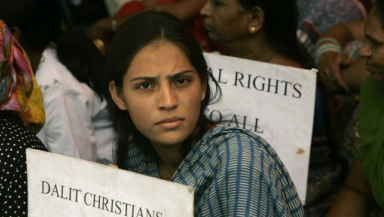
In national elections due in the next few months, observers warn that if a Hindu Nationalist government comes to power attacks on Christians in India will increase.
There has been a spate of attacks on Christians and Muslims in India in the last year. Mapping of the attacks on Christians and Muslims show that the worst affected areas are Gujarat and Orissa, where the upper-caste Brahmins hold significant economic power.
They use this power to enforce their ideology which is to reduce the "Dalits" - or lowest caste - and Christians and Muslims to be second class citizens.
In Kandhamal, Odisha, in 2008 attacks were carried out on "tribal" Christians and the agencies that helped them, with 38 Christians killed, 18,000 injured and 50,000 displaced.
World Vision, a Christian relief agency, was forced out of the area.
Before that, in 2002, some 2,000 Muslims were killed over three days in Gujarat. The chief minister, Narendra Modi, described himself as a Hindu nationalist and was accused of condoning the attacks. He is the prime ministerial for the BJP party.
A seminar held this week in Delhi by the Centre for Religious Freedom to develop a Religious Freedom Support Group was encouraged to form groups that would respond to attacks at six levels:
1) Spiritual support providing spiritual and crisis counselling and prayer support 2) Media and information 3) Legal rights- providing details of making legal complaints nationally and to international for a 4) Developing good relationships with the police for protection and action 5) Developing good relations with community leaders so that churches can be seen as a benefit to their communities 6) Direct relief – providing contacts for relief support and places of refuge
Seminar participants were encouraged to see that issues of religious freedom could not be separated from issues of social justice and economic empowerment, something which appears to go against the default position of many pastors in India.
One aid worker said pastors in her city held that their role was evangelism and left social action to agencies. This was held to play into the hands of those who wish to allow Christians to practice their faith as long as they do not do anything to address the social injustice that Dalits experience.
Research shows that the reason why attacks on Christians have increased in the last twenty years is because indigenous Christian mission groups have been addressing the social needs of the poorest of the poor - Dalits and Tribals.
These groups have been empowered by Christians through the gospel, education and social support who have therefore become the object of attack.
Attacks against Christians have become intense in the last 10 years in seven states, two in South India and five in the north.
"The Indian church will be better equipped to address religious freedom through the creation of these support groups to address the spiritual, legal, political, social and development issues that such persecution raises," said Rev Richard Howell, the General Secretary of the Evangelical Fellowship of India, which sponsored the event.













